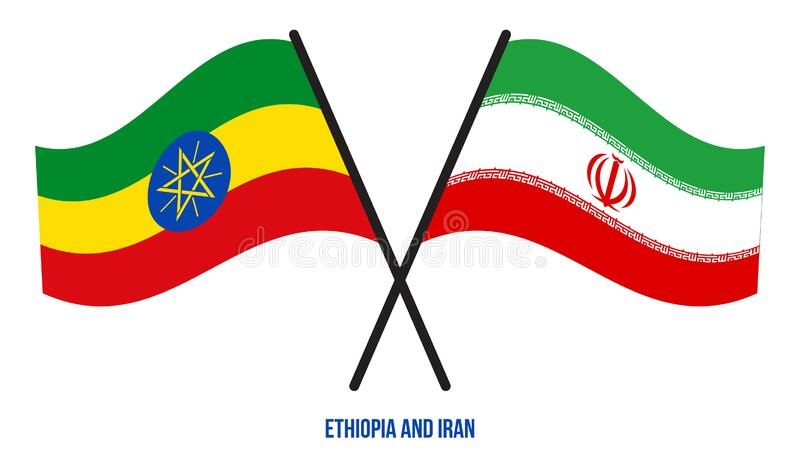
Ancient Persia and Ethiopia were cradles of civilizations and these great Civilizations were in regular contacts and full of exchanges usually through trade and cultural mechanisms. They shared a number of norms, cultural reflections, ethical and moral standards. It is common to come up with ancient Persian heroes (such as Cyrus the Great, Darius, Xerxes, etc) and their brilliant history in the Ethiopian scriptures meanwhile the great leaders and kings of ancient Aksum are not strange in the history books of Iran.
The beauty and splendor of the mosques and temples of Isfahan are known to the world and the impressive ruins of Persepolis are a shrine to which students of antiquity flow in never ending pilgrimages. The monolithic obelisks, giant stelae, royal tombs and the ruins of ancient castles in Aksum and other areas are tangible and evidences of the Ethiopian civilization. The Countries rich cultural legacy is reflected in part by their 24 and 15 UNESCO World Heritage Sites for Iran and Ethiopia respectively.
Not only as pioneers of ancient civilization, have the two countries shared similarity in embracing multiculturalism and diversity. Historically a multinational state, Iran remains a pluralistic society comprising numerous ethnic, linguistic and religious groups. In the same vein, Ethiopia is a mosaic of Nations with their unique language, religion and cultural reflections. Both countries fully embrace multiculturalism as their governance style. The two countries are typical examples in properly managing societal diversity and promoting peaceful coexistence at a time when nationalist rhetoric is on the rise at a global scale.
The two great countries went through and navigate challenges in their long history. Both were firmly fought against their respective foreign aggressors and sacrificed their people for securing their independence. They secured victory against powerful foreign forces, thanks to their martyrs who teach generations of people to the sanctity of defending freedom and independence.
In the sense of modern diplomacy, the bilateral relationship between Iran and Ethiopia was established in 1950. The first country Iran reached out to Sub-Sahara Africa was to Ethiopia, and Ethiopia’s Emperor Haile Sellasie I was the closest ally of Mohammad Reza Pahlavi, the last king of Iran, in the African Continent. The two leaders paid official visits to each other countries in the 1960s and early 1970s.
The two countries shared similar views on global and regional issues. Iran and Ethiopia are among the founding members of the UN and signatories of the UN Charter. Even preceding to the UN, the two countries’ commitment to adhering principles of promoting peaceful world and mutual recognition and respect non-interference by joining the League of Nations though the latter has completely failed to fulfill its mandate.
The two countries are also advocators and members of the Non-Aligned Movement (NAM). Both countries are active participants of the NAM, and through it, they vehemently oppose any interference, subversion, use of force or coercion by powerful countries and their efforts in imposing any sort of ideology in other countries policy orientation. Through NAM, Iran and Ethiopia encouraged member countries to promote independence, equality and national identity and effective cooperation.
The strong cooperation of the sisterly countries also manifested in other International and regional domains. Both are members of the G-77 and South-South cooperation and other platforms. Through these arenas, Iran and Ethiopia strived to build a consensus based rule for international and regional issues and promote win-win diplomatic framework in addressing global and regional challenges.
Leaders of Iran and Ethiopia made the far-sighted decision by implementing the Amity Treaty in 1971, which laid important political and legal foundations for consolidating the friendship the two peoples had forged and promoting bilateral friendly cooperation for the long run. The signing of the Amity Treaty demonstrated the firm will of the two states as well as the people of the two countries to promote long-term development. It was signed to strengthen mutually beneficial cooperation to achieve common development and prosperity. The Amity Treaty could serve as a solid foundation upon which Iran and Ethiopia may build a more fruitful and lasting collaboration between the two countries in the many domains where they share common interests and pursue common goals and objectives. It can become a central cornerstone of their improved ties in the twenty first century.
Regional and global economic and political developments show that it is time to reinforce bilateral ties on equal footing. For the foreseeable future, there is much more that unites Iran and Ethiopia. As we are witnessing a major shift in the world landscape unseen in a century, Iran is ready to work with Ethiopia to strengthen their relationship and lift the friendly cooperation between the two countries to new levels to bring more benefits to the two countries and their people. It is also imperative that in recent years, in the face of a complex and ever-changing international landscape, Iran and Ethiopia need to keeping growing deeper and bilateral relations have to be advanced to a higher stage.
Iran and Ethiopia could boost bilateral economic and trade relations, especially given their national technical and engineering potential and capabilities. They need to keep improving existing economic cooperation to achieve sustainable development based in a mutually beneficial way. The current trade volume between the two countries over the last couple of years stood at around 50 million per annum. Given the huge and proximate market and economic potential of the two countries, it needs to grow steadily. There are Iranian companies that are already invested in agro-processing and energy but Iran needs to see more companies engaged in the Ethiopian investment sector. Economic complementarities provide a powerful impetus for mutually beneficiary development.
In the context of unceasing attempts by some countries to contain the technological development of our countries, interaction in the field of science and innovation is of particular importance. We need to strengthen scientific, technical and innovative cooperation. There are some Ethiopian students who pursue their second and third degree at Iranian Universities, but we need to work more to seize the potential.
The two countries also share similar views on various regional and global issues. Iran and Ethiopia should start to cooperate to safeguard regional peace and stability no matter what pressures and impacts may come from other countries. They need to work together to defend their interest in the Gulf of Aden; in particular, by mutually fighting piracy and terrorist activity in the Region. Strong bilateral cooperation of Iran and Ethiopia will serve as a stabilizer in the Gulf of Aden. They need further deepen political cooperation and always provide strong backing for each other (the two countries are already cooperative of each other at the UN, usually through supporting of candidatures of the two countries for different posts).
They are devoted to the principle of multilateralism and opposing hegemony and power politics and in this sense they are broadly like-minded. Their interests and agendas often align as both give the centrality of the UN-based international legal framework, especially the principle of non-interference in the internal affairs of sovereign states. Thus, we need to consolidate the existing substantial policy convergence on international issues.
In sum, Iran and Ethiopia are not great countries of the past; they are also great countries of the future. They have immense economic, cultural, commercial and political potential and the leaders need to materialize it. For that end, the existing Amity Treaty, which is in the 50th year of commemoration, will be beneficial and serve as a benchmark.
THE ETHIOPIAN HERALD AUGUST 27/ 2021



